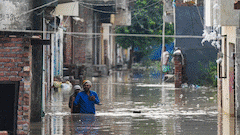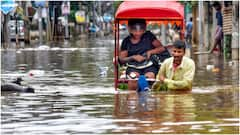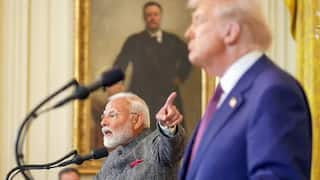Maratha Quota Demand: Why Maharashtra Is Witnessing Violent Protests — All You Need To Know
The demand for reservation for the Maratha community has been a subject of discussion and debate for many years.

New Delhi: Amid the ongoing protests for Maratha reservation, the Maharashtra government on Tuesday announced that it will begin action on the long-standing demand of the Maratha community for Kunbi caste certificates, which make them eligible for reservation in the Other Backward Classes (OBC) category.
The certificates will be issued to the descendants of those recorded as part of the Kunbi sub-caste during the pre-independence Nizam era to enable them to get quota under the OBC category. The decision was taken to pacify the Maratha community following violent reservation protests.
The government accepted the first report of a committee chaired by retired high court judge Sandeep Shinde. The committee was established to determine the procedure for granting Kunbi caste certificates specifically to Marathas in the Marathwada region.
Why Was There Fresh Protests?
Activist Manoj Jarange launched a fresh round of agitation to demand reservation for the Maratha community in government jobs and educational institutions at his native Antarwali Sarati village in Jalna district. Jarange had been on an indefinite fast in pursuit of quota rights for the Maratha community.
Several incidents of violence had also erupted in various parts of the state in relation to this demand.
Jarange had observed a hunger strike in this village in September this year, however, he had withdrawn the protest giving an ultimatum of 40 days till October 24 to the government for the grant of quota.
Who Are The Marathas?
The Marathas, historically referred to as ‘warriors’, are a group of clans comprising peasants and landowners, among others. They constitute about 33 per cent of the state’s population.
The demand for reservation for the Maratha community has been a subject of discussion and debate for many years. The Marathas have sought reservation in education and government jobs based on their social and economic conditions.
Around four decades ago in 1982, Mathadi Labour Union leader Annasaheb Patil first started the Maratha quota agitation in Mumbai. Since then, the Maratha reservation has become an integral part of politics in the state.
The Maratha Mahasangh and the Maratha Seva Sangh organized a strong movement for the Maratha reservation in 1997.
In the run-up to the 2014 Assembly elections, the Congress-NCP government led by Prithviraj Chavan brought an ordinance pronouncing 16 per cent reservation to Marathas in government jobs and education.
However, the decision was soon challenged in the Bombay High Court which stayed the decision.
Maratha Quota Under Fadnavis Govt
Two years later in 2016, the Kopardi rape and killing of a 14-year-old girl rocked Maharashtra. During this time, the rape-cum-murder incident triggered an outrage among the community whose members took to streets and vented their anger against the stringent SC/ST Atrocities Act (the accused were Dalits) and demanded justice for the victim.
The demand for justice in the rape-murder case was coalesced with the large issue of Maratha reservation and the agitation attracted widespread attention.
The Maratha Kranti Morcha orchestrated a series of massive rallies and protests demanding reservation in education and government jobs.
The Fadnavis government constituted the State Backward Class Commission (SBCC) in June 2017 to study the social, financial, and educational status of the Maratha community. The commission submitted its report in November 2018.
The same month, based on the findings of the commission, the government gave its nod for reservation to Marathas under a special provision — Socially and Educationally Backward Class Act.
However, the Bombay High Court reduced the quota to 12 per cent from 16 per cent originally proposed.
Maratha Quota In Supreme Court
The Bombay High Court judgment upholding the law was challenged in the Supreme Court in 2019.
In May 2021, the Supreme Court struck down Maharashtra's Socially and Educationally Backward Classes Act, 2018, which granted reservation to the Maratha community, for violating the 50 per cent ceiling.





































